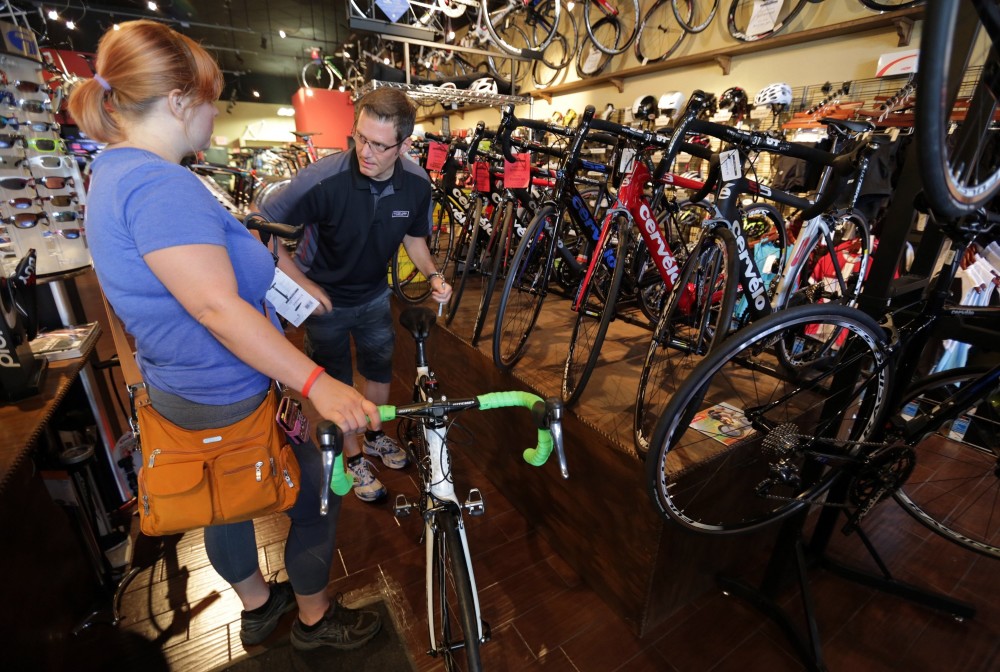By Sara K. Clarke
Orlando Sentinel.
It takes a special buyer to consider spending $3,600 on the shiny red Pinarello that sits among other high-end bicycles at Winter Park Cycles in Lake Mary, Fla.
And frankly, owner Ward Bates says there are fewer of those buyers in Lake Mary than he thought there would be. To solve that problem, he’s converting the brick-and-mortar store into an online distribution center.
Winter Park Cycles is dealing with a situation that faces retailers everywhere: How best to blend physical stores and online operations in a world that now demands that retailers do a good job at both.
“You kind of have to figure out what’s the combination. It’s not one or the other anymore,” said Barbara Kahn, director of the Jay H. Baker Retailing Center at the University of Pennsylvania’s Wharton School. “It’s an exciting time in retail.”
The result is retailers such as Wal-Mart offering shoppers the option to order online and pick up in store. Or online heavyweight Amazon.com building new distribution centers so it can cut delivery times to compete with physical stores.
National brands that once sold exclusively online, such as Warby Parker eyeglasses or men’s clothier Bonobos, are opening shops so would-be customers can touch and feel their products.
“There’s a lot of different ways to make it work,” Kahn said.
Winter Park Cycles’ plan included closing the underperforming Lake Mary store last month. The company will continue to sell bikes in person at its more successful store in Orlando, Fla. The payroll that once provided Lake Mary with a handful of retail workers will pay for a national advertising push.
The online option could help Winter Park Cycles stock more variety, because some brands require dealers to make a minimum purchase, which might be more than the store can sell in Orlando alone.
“For us as a business, it helps us grow beyond just the Orlando market,” Bates said. “You can only sell so many of a certain thing in a certain market.”
The bigger audience online is one reason that another Florida retailer, Other Peoples Property, has focused almost exclusively on online sales. The business sells hip, vintage clothing items to consumers across the country using the micro-retailing website Etsy.
Owner Dana Marie Roquemore has also found ways to expand her in-person sales by hosting occasional “Swap & Shop” events at commercial spaces around town. The get-togethers allow fashion lovers to trade clothes with one another while introducing them to items available for purchase at Other Peoples Property.
“The swaps are really fun and really successful,” Roquemore said. A permanent shop is a possibility in the future, she said, but “right now, I probably don’t sell enough to be able to have a physical space.”
In some cases, online sales can be trickier than brick-and-mortar ones, because along with the broader customer base comes a larger pool of competitors.
“There can be people all over the world selling those same products,” said retail consultant Britt Beemer, president of America’s Research Group. “Everybody always thinks the grass is greener on the other side of the fence. And you get on the other side of the fence, and the grass is dead.”
In the case of a store like Winter Park Cycles, a move online may be trading one set of problems for another, Beemer cautioned.
“There’s very few things Americans want to buy without seeing one,” Beemer said. “And that’s why retail stores are successful.”
Kahn said as retailers pursue what the industry calls “omnichannel” service, it’s unlikely that future shoppers will end up with one way over another.
“There’s no way it’s going to be a full online world,” she said. “There’s still going to be a need for offline.”
___














































































































































































































































































































































































